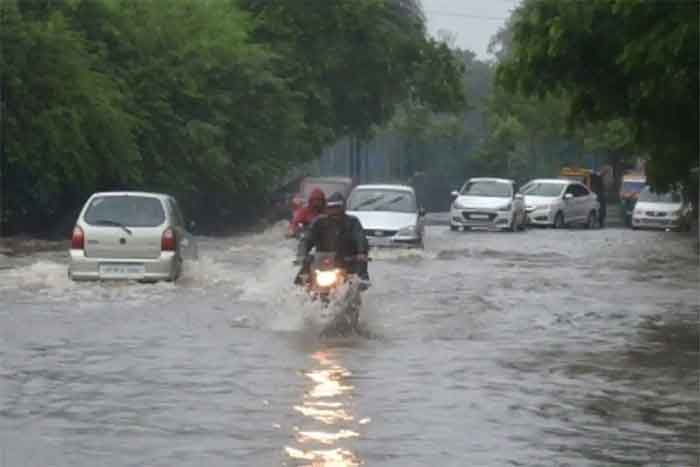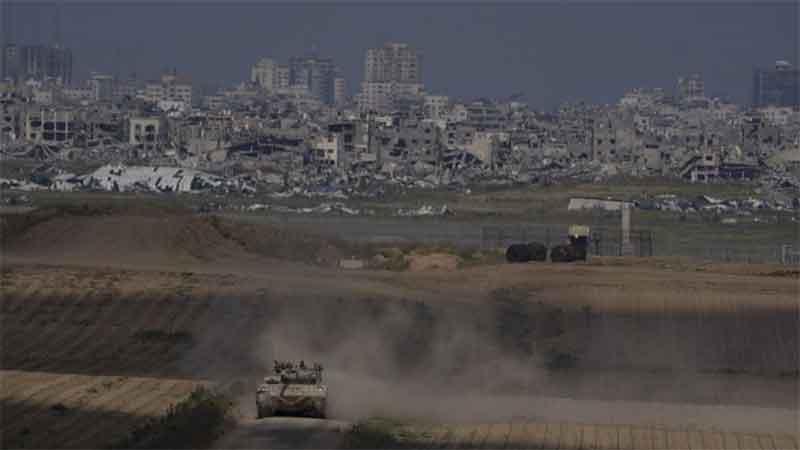The lockdown-induced loss of livelihoods has left many vulnerable villagers in Madhya Pradesh unable to feed their families even two square meals a day.
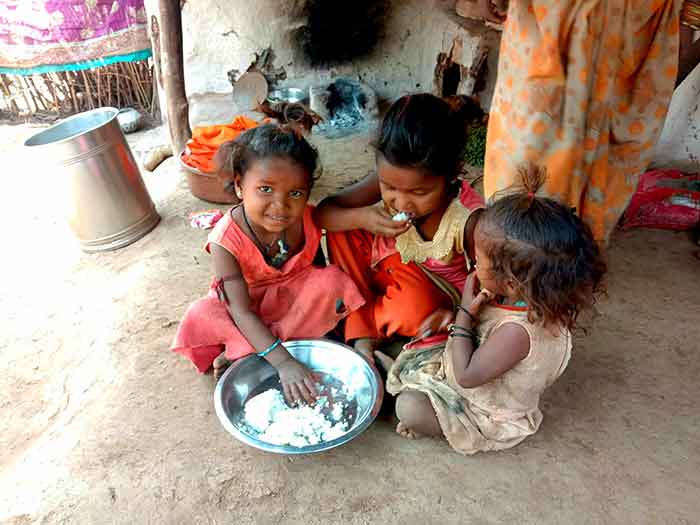
Bhopal: Four-year-old Gudiya* (name changed) smiles shyly as she eats salted rice from a plate that she shares with her two sisters. The three girls from Birhulia village in Umaria, Madhya Pradesh haven’t eaten dal in the last few weeks and are surviving on plain rice and chapatis with salt. Their parents, both daily wagers, haven’t found work since the lockdown began and cannot purchase food.
As India battles the COVID-19 pandemic, the economically marginalised villagers in tribal areas of Madhya Pradesh are fighting another battle — hunger. Loss of livelihood due to the lockdown has left many of them with no source of income, leading to grave food insecurity. Many of them can barely manage a measly meal of plain rice, chapati and salt. The lucky ones manage to get achar (pickles).
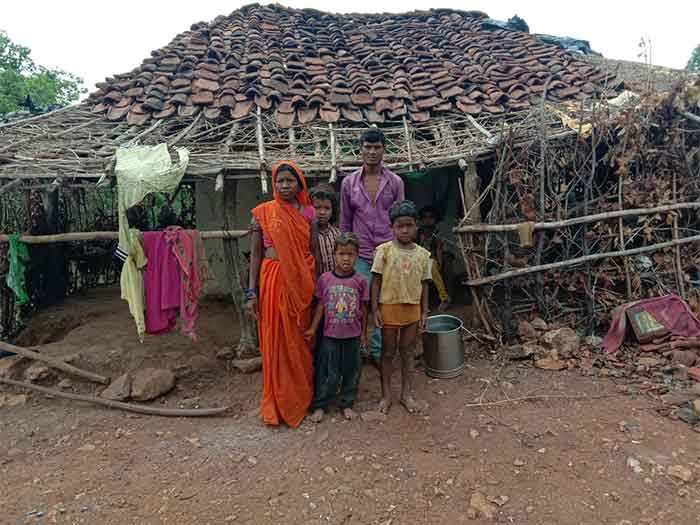
Faguni Bai Baiga, a daily wager from Birhuliya says that her husband has barely worked for ten days in the past year. They have fallen short of money to buy food and vegetables for their three children, aged 8, 7 and 5. “We have no alternatives to earn a living wage. I have hardly earned Rs 1500 a month over the last year, which is not enough to feed a family of five,” she said.
For a while, the shopkeeper nearby lent her groceries, including cooking oil, two sacks of rice, 2 kg salt, 5 kg lentils, chillies and spices. “There is currently a shortage of vegetables, and they have become more unaffordable. Moreover, I am Rs 3000 in debt to them and have no means to repay.”
“The moneylenders have also refused to lend to us as they know that we cannot find work,” she added.
The family does not have a ration card either. They have applied for it a few times, Fauguni said, but the local panchayat hasn’t followed up with the application.
Waiting for Rations
The lockdown in April and May this year proved difficult for many villagers like Faguni, who are yet to receive their ration cards. Almost 11.15 per cent of Madhya Pradesh’s population isn’t covered under the Public Distribution System (PDS). Some complain that their fingerprints aren’t being recognised as they have eroded due to manual labour.
Last year, the MP government announced that distribution of rations under PDS and Integrated Child Development Services (ICDS) would continue uninterrupted during the lockdown. Rations for the months of March, April and May were distributed in one go to stave off hunger among those who were rendered unemployed during the lockdown. But providing balanced nutrition was still a big ask.
This year, on May 5, Shivraj Singh Chouhan, Chief Minister of Madhya Pradesh, announced that no poor would have to live without rations during the Covid crisis. “Foodgrains should be distributed to them even if they don’t have an eligibility slip, Aadhaar Card and other documents,” he announced.
 However, this doesn’t seem to have happened efficiently in some regions. “The ration distribution was severely affected in Panna as the PDS faced a grain shortage. Some people could manage to get only half of their quota of rice and wheat. Shortage of lentils, vegetables and cooking oil was still a grave issue, keeping them from having a balanced diet,” said Ravikant Pathak, a social activist from Panna. He adds people who don’t have ration cards faced more difficulty as they were ineligible to avail PDS benefits, despite the announcement by the Chief Minister. Many people had to borrow food from their neighbours during these two months.
However, this doesn’t seem to have happened efficiently in some regions. “The ration distribution was severely affected in Panna as the PDS faced a grain shortage. Some people could manage to get only half of their quota of rice and wheat. Shortage of lentils, vegetables and cooking oil was still a grave issue, keeping them from having a balanced diet,” said Ravikant Pathak, a social activist from Panna. He adds people who don’t have ration cards faced more difficulty as they were ineligible to avail PDS benefits, despite the announcement by the Chief Minister. Many people had to borrow food from their neighbours during these two months.
Ram Charan Gaur, a daily wager from Patti village in Panna, is one of them. “I haven’t found any work in these three months. My family of six ask the neighbours for food, but how long can we live like this? Now the neighbours are also tired of helping us out,” he said.
Worsening Malnutrition
“The families of daily wagers, who live hand to mouth, are the worst affected in the lockdown,” believes Bhupendra Tripathi, a social worker from Umaria. “Most of them fall under Below Poverty Line (BPL) category, and their children depend either on mid-day meals in schools or those provided by local anganwadis for proper nutrition, which includes ready-to-cook (RTC) and ready-to-eat (RTE) foods. Even for pregnant women and lactating mothers, anganwadis are the only source of nutritious food. But schools haven’t been open since last year and anganwadi centres have stopped functioning efficiently in many areas due to several factors such as lack of groceries for distribution, shortage of staff in the subsequent lockdowns,” Tripathi added.
Narayan, of Kalyanpur village in Panna is one of the men facing the brunt of this. “My youngest son is two years old, and we are dependent on the local anganwadi for his take-home ration. But they haven’t sent his share of food since the last two months,” he said.
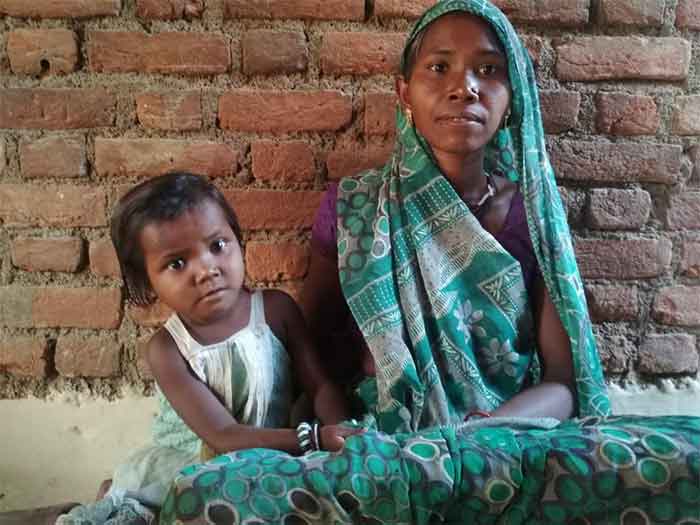
Asha Rani Gaud from Gandhigram village in Panna is also worried about the health of her children. Earning Rs 200 as a daily wager in a diamond mine, she only finds work for 12-15 days a month. This hardly generates enough income to look after her four children. “My husband, who worked in a stone mine, died last year due to silicosis. I haven’t found work in these last few months. We barely survive on wheat and rice that we get from the PDS. I don’t have money to buy vegetables and dal for my children,” Asha said.
Health indicators among children and women in Madhya Pradesh were already poor, even before the pandemic. According to the 2018 National Family Health Survey-4 42% of the children in MP are stunted, 43% are underweight, and 26% are wasted. Infant mortality rate is estimated at 51 deaths per 1,000 live births.
Sachin Kumar Jain, a Bhopal based food security expert, said that given the infant mortality rate is already high in MP, this situation of worsening food insecurity will lead to more deaths due to malnutrition. Jain believes this to be a kind of emergency where the problem of loss of livelihood, inability to migrate for work, inflation in cost of food, etc. have all severely impacted access to nutrition among the most vulnerable.
“This is a situation where people cannot find alternatives, even if they want to. Even the ICDS provides only supplementary food, not a complete diet. This lack of food security and proper nutrition will have a long term impact on the children’s health. This time the focus should have been on pregnant women, lactating mothers and small children, but no special efforts were made for them,” said Jain.
Shuchita Jha is a Bhopal-based freelance journalist and a member of 101Reporters.com, a pan-India network of grassroots reporters.
GET COUNTERCURRENTS DAILY NEWSLETTER STRAIGHT TO YOUR INBOX

